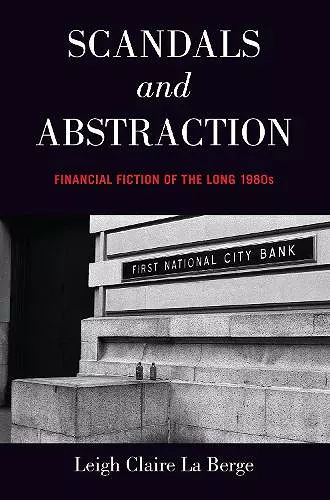Scandals and Abstraction
Financial Fiction of the Long 1980s
Format:Paperback
Publisher:Oxford University Press Inc
Published:22nd Jun '20
Currently unavailable, and unfortunately no date known when it will be back
This paperback is available in another edition too:
- Hardback£99.00(9780199372874)

The Long 1980s could be summed up handily in the annals of U.S. cultural history with the enduring markers of Ronald Reagan's presidency, Oliver Stone's film Wall Street, and Dire Straits's hit single "Money for Nothing." Despite their vast differences, each serves to underscore the confidence, jingoism, and optimism that powered the U.S. economy throughout the decade. Mining a wide range of literature, film, and financial print journalism, Scandals and Abstraction chronicles how American society's increasing concern with finance found expression in a large array of cultural materials that ultimately became synonymous with postmodernism. The ever-present credit cards, monetary transactions, and ATMs in Don De Lillo's White Noise open this study as they serve as touchstones for its protagonist's sense of white masculinity and ground the novel's narrative form. Tom Wolfe's The Bonfire of the Vanities and Oliver Stone's Wall Street animate a subsequent chapter, as each is considered in light of the 1987 stock market crash and held up as a harbinger of a radical new realism that claimed a narrative monopoly on representing an emergent financial era. These works give way to the pornographic excess and violence of Bret Easton Ellis's epochal American Psycho, which is read alongside the popular 1980s genre of the financial autobiography. With a series of trenchant readings, La Berge argues that Ellis's novel can be best understood when examined alongside Ivan Boesky's Merger Mania, Donald Trump's The Art of the Deal, and T. Boone Pickens's Boone. A look at Jane Smiley's Good Faith and its plot surrounding the savings and loan crisis of the 1980s and 1990s, concludes the study, and considers how financial reportage became a template for much of our current writing about of finance. Drawing on a diverse archive of novels, films, autobiographies, and journalism, Scandals and Abstraction provides a timely study of the economy's influence on fiction, and outlines a feedback loop whereby postmodernism became more canonical, realism became more postmodern, and finance became a distinct cultural object.
Theoretically sophisticated and politically engaged, Scandals and Abstraction is a tour-de-force treatment of how financial logics circulated in 1980s' literature and culture. La Berge asks compelling questions and the answers she provides offer startling insights into some of the ways financialization has altered our lives." * Mary Poovey, author of Genres of the Credit Economy *
Taking up the question --what is a financial age, and what is a financial aesthetic mode?-- La Berge bypasses the now-familiar discovery of a genre of the finance economy to register the ways that financial logics have increasingly colonized literature as such, much as they have colonized the larger economy. In so doing, Scandals and Abstraction develops surprising categories and concepts in a bravura effort to reconcile Marxist and poststructuralist approaches. This is a dangerous game and period-defining intellectual quest; La Berge plays explorer in ways agile, nuanced, and innovative." * Joshua Clover, author of Of Riot *
For the economists Kiyotaki and Moore, money is 'strange stuff.' Financial monies, in the apparent opacity of their workings, seem yet stranger. La Berge brings clarity to the financial turn by way of the founding assumption that the material practices of an economy * options, futures, derivativestraceably contain the logic of its aesthetic forms. A template text for those who would understand cultural change at the close of the American century, Scandals and Abstraction is theoretically informed and intellectually graceful. I learned from it even as I enjoyed it." Richard Godden, author of William Faulkner: An Economy of Complex Words *
ISBN: 9780190845988
Dimensions: 155mm x 231mm x 15mm
Weight: 635g
242 pages